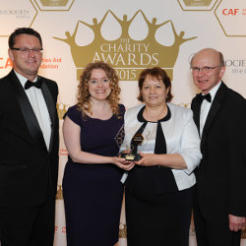A charity set up by JK Rowling ten years ago to close children’s institutions and orphanages in developing countries and resettle their young residents with their families or foster carers, has won the Overall Award at The Charity Awards 2015.
The judges were so impressed by Lumos Foundation’s work in Moldova and throughout Eastern Europe that they chose it as the winner not only of the international aid and development category, but for the biggest prize of the night.
Lumos chief executive Georgette Mulheir and Dr Irina Malanciuc, director of Lumos Moldova, accepted the award from minister for civil society, Rob Wilson, and John Low, chief executive of overall Charity Awards partner Charities Aid Foundation.
Malanciuc said: “I came here yesterday - I'm really surprised to have won. I would like to thank you all very much.
"I am very impressed by this evening each and every one of the charities here are doing very good jobs. I would also like to say thank you to this country for the help you have given to mine, which is one of the poorest in Europe - you have helped people and families who live in difficult conditions."
Harry Potter author JK Rowling was moved to set up the charity that would become Lumos in 2005 after reading about children in caged beds in the Czech Republic. Lumos’ application to The Charity Awards centred on its work in Moldova, Europe’s poorest country with one of the highest rates of children separated from families and placed in institutional care, but the charity has also worked to change policy and practice in countries including Hungary, Bulgaria, Romania, Serbia, and Haiti.
In 2007, with support from Lumos, Moldova’s government pledged to reform its childcare system, closing institutions and replacing them with family and community-based services. The charity found that while non-disabled children were easy to place back into families, disabled children faced being left behind, as Moldova had no system to allow inclusive education in local mainstream schools for thousands of disabled children living away from home in grim residential special schools. So Lumos set about creating inclusive educational services from scratch.
It was a process that involved changing mindsets at every stage of the process – putting the needs of children above the needs of the State and at the heart of decision-making. Thousands of professionals had to be retrained. The charity used financial modelling to prove that replacing institutional care with home and community-based services is cheaper, as well as better for the children.
By now the number of institutionalised children in Moldova has reduced by 80 per cent and the Moldovan government has drafted a new action plan for complete deinstitutionalisation for the period up to 2020.
Mulheir and Malanciuc accepted the award before an audience of 600 charity sector leaders, politicians and celebrities at a gala presentation dinner in London hosted by Rugby World Cup winner Will Greenwood.









